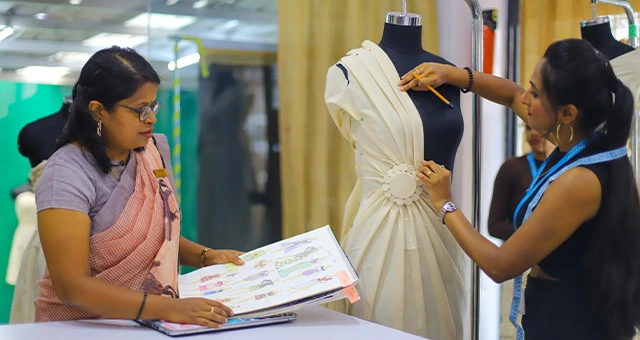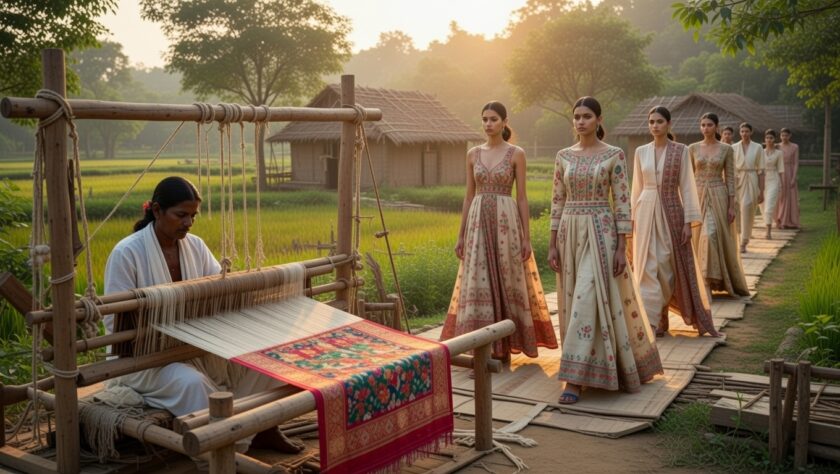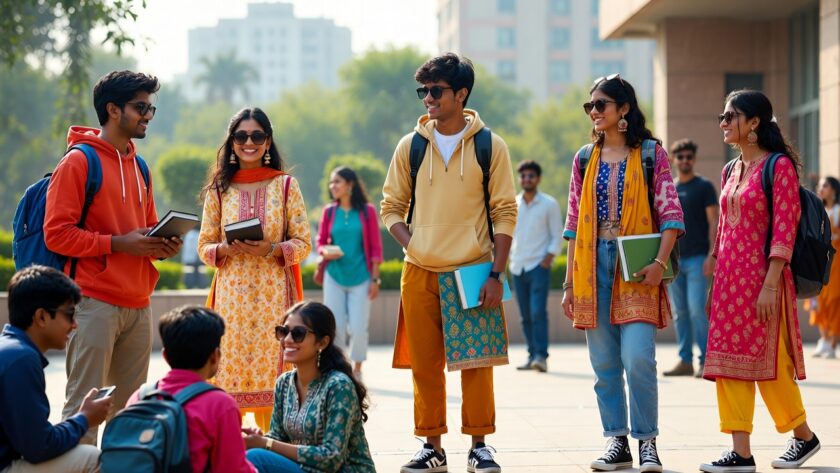Lucknow: The delicate dance of a needle over a fine muslin cloth, a timeless tradition known as chikankari, has long defined Lucknow’s sartorial identity. It’s a city where heritage is not just preserved in museums but woven into the very fabric of daily life. Yet, a seismic shift is underway in the global fashion industry, driven by digital innovation, a demand for sustainability, and a new appreciation for cultural authenticity. To stay relevant, fashion institutes across Uttar Pradesh—and particularly in Lucknow, the spiritual home of Awadhi crafts—are reimagining their pedagogy to prepare a new generation of designers. This transformation is a critical blend of honoring the past while embracing a digital-first, ethically conscious future.
The global fashion industry is on a trajectory of significant growth, with a market size projected to exceed $2 trillion by 2026. However, this growth is accompanied by a new set of rules. Today’s consumers demand not only high-quality design but also ethical sourcing and sustainable practices. The digital revolution has made virtual try-ons and e-commerce staples, while employers seek graduates who are as skilled with software as they are with a needle. For a region like Uttar Pradesh, with its deep roots in traditional crafts like zardozi and handloom weaving, the challenge is to seamlessly blend this rich heritage with the demands of a modern, global market. Institutes like the National Institute of Fashion Technology (NIFT) Lucknow are leading this charge, restructuring their curricula to forge a new path.
The New Curriculum: From Sketchbook to Screen
The education of a modern fashion designer begins not with a sketchpad, but with a cursor. Fashion institutes are now deeply integrating technology into their core curriculum, recognizing that digital proficiency is a non-negotiable skill. Students are learning to master software like CLO 3D for virtual garment design, which not only accelerates the creative process but also drastically reduces material waste—a critical win for sustainable fashion. At NIFT Lucknow, students are now able to create digital prototypes and patterns, experimenting with new designs in a virtual space before any fabric is ever cut.
But the digital revolution goes beyond design. Institutes are also teaching students to create immersive experiences using Augmented Reality (AR) and Virtual Reality (VR), allowing for virtual try-ons or AR-enhanced showcases of a new chikankari collection. This tech-savvy approach resonates with modern consumers and the thriving community of travel photographers who are keen to capture Lucknow’s vibrant aesthetic in a visually compelling way. Institutes are also incorporating AI for trend forecasting and consumer behavior analysis, skills that are highly sought after by the industry, where over 40% of brands are adopting AI-driven solutions.
Honoring the Handloom: Marrying Heritage and Modernity
While technology is an undeniable force, the soul of fashion education in Lucknow remains its deep connection to cultural heritage. Institutes are fiercely committed to preserving and modernizing Awadhi crafts. They understand that the intricate handwork of chikankari, with its 32 distinct stitches, is not a relic of the past but a unique selling point for the future. Students are trained by master artisans, learning traditional techniques and then challenged to adapt them for modern silhouettes, from contemporary fusion wear to high-end streetwear.
This cultural focus extends to projects that encourage students to find inspiration in their surroundings. Collections are designed around the architectural motifs of the Imambaras or the bustling energy of the Chowk markets, and then showcased in iconic city locations. These creative projects often become a focal point for travel photographers, who capture the dynamic interplay of traditional craftsmanship and modern design against Lucknow’s historic backdrops. Through heritage walks and craft workshops, institutes are fostering a profound appreciation for Uttar Pradesh’s textile legacy, preparing students to become not just designers, but cultural ambassadors.

From Classroom to Runway: The Business of Fashion
A design is only as good as its marketability, and fashion institutes in Lucknow are bridging the gap between academia and the industry. Through collaborations with local and national brands like Anokhi and Fabindia, students gain invaluable real-world exposure. Internships and live projects allow them to work on collections that incorporate UP’s crafts, such as designing a line of modern chikankari kurtas for international export. This hands-on experience is complemented by a strong emphasis on entrepreneurship, with modules teaching students how to launch their own labels and work with artisan cooperatives. This approach is particularly relevant in Lucknow, a city where small-scale craft businesses are a cornerstone of the economy. Guest lectures from industry leaders and participation in major events like Lakmé Fashion Week provide students with critical insights into global trends and essential networking opportunities.
A Sustainable Thread: Weaving Ethics into Every Garment
Sustainability is no longer a niche concept but a core component of modern fashion education. In a region rich in handloom traditions, this focus feels deeply organic. Students are taught to work with eco-friendly fabrics like organic cotton and khadi, and to implement zero-waste pattern cutting and upcycling techniques. Collaborations with local artisans allow them to repurpose chikankari scraps into modern accessories, a beautiful blend of tradition and sustainability.
Beyond design, institutes are instilling an ethical consciousness in their students. Courses on circular fashion, ethical sourcing, and the environmental impact of textile production are becoming standard. These initiatives not only position graduates to address the challenges of fast fashion but also appeal to global markets, where 51% of consumers prioritize sustainable brands. This focus also creates a powerful narrative for travel photographers, who are increasingly documenting sustainable fashion initiatives and artisan communities for a global audience.
A New Era of Style
Fashion institutes in Uttar Pradesh, especially in Lucknow, are in the midst of a profound transformation. By integrating advanced technology, championing sustainability, preserving their unique Awadhi heritage, and aligning their curricula with market demands, they are preparing students to thrive in a globalized fashion landscape. These changes are not just about ensuring employability; they are about amplifying UP’s cultural legacy, making it a magnet for designers, ethically conscious consumers, and travel photographers who seek to capture the story of a region that is beautifully and seamlessly weaving its past into its future.










